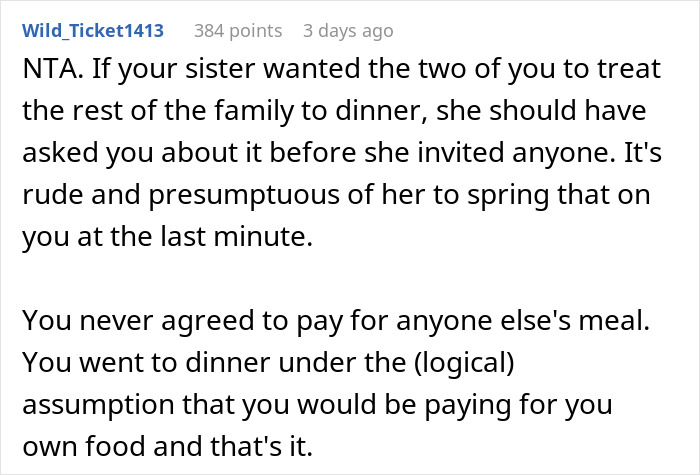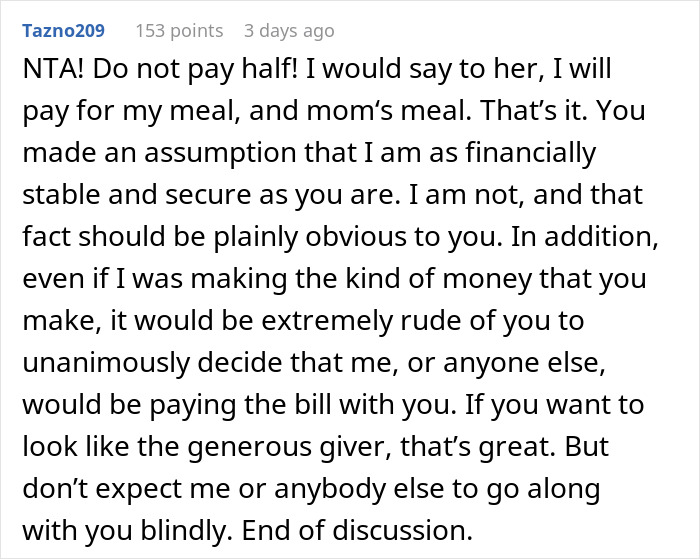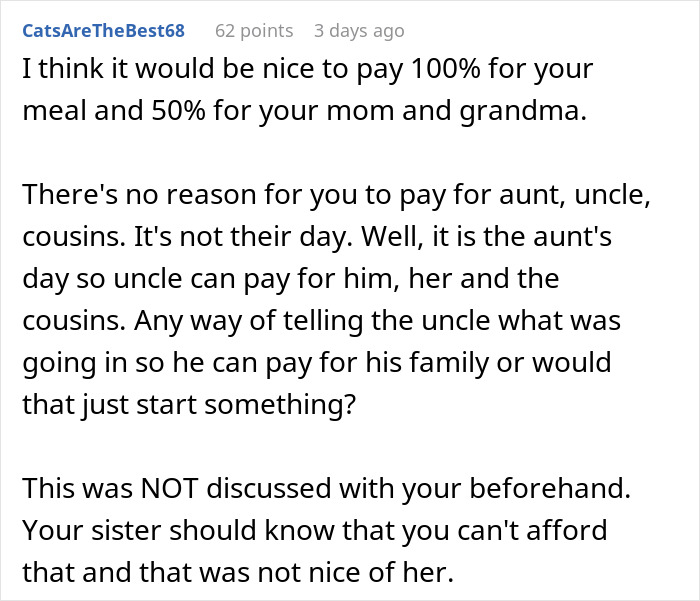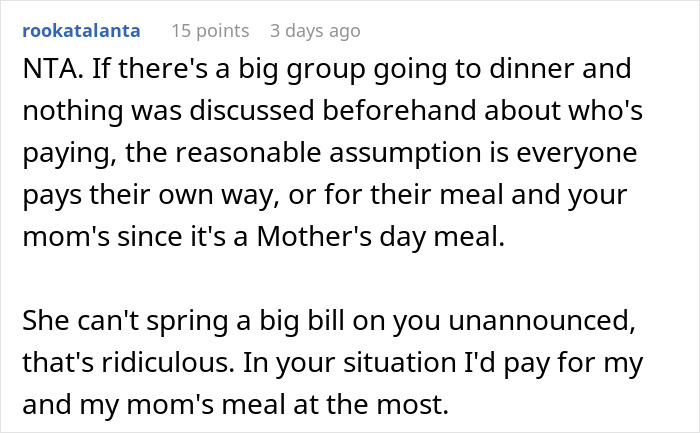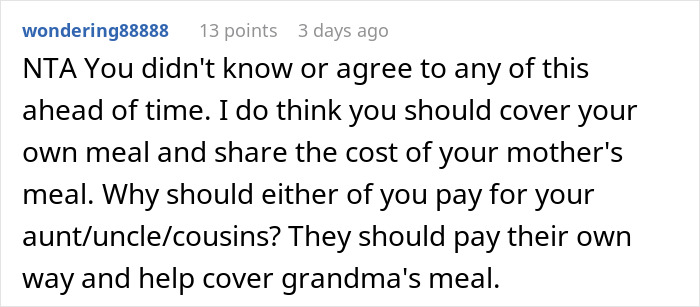It’s been said that there’s no such thing as a free lunch. But that’s not entirely true. Especially when it comes to dining out, and some generous person offering to pay the bill on your behalf. But that doesn’t always happen. In these tough economic times, eating at a restaurant is a luxury for many. Money doesn’t grow on trees. And often, adults choose to split the bill, or pay their own portions of it.
That’s sort of what one person was expecting when they went for a Mother’s Day dinner recently, along with a big group of family members. Imagine their surprise when the check arrived and they were informed that they and their older sister would be “treating the table.” The person doesn’t feel it’s fair and still hasn’t contributed. They’re unsure if they should. Bored Panda ask etiquette expert Rosalinda Randall what she thinks…
Breaking bread with family is meant to be a joyous occasion

Image credits: freepik (not the actual photo)
But a Mother’s Day dinner turned into drama when one person found out they’d be footing half the bill, after-the-fact
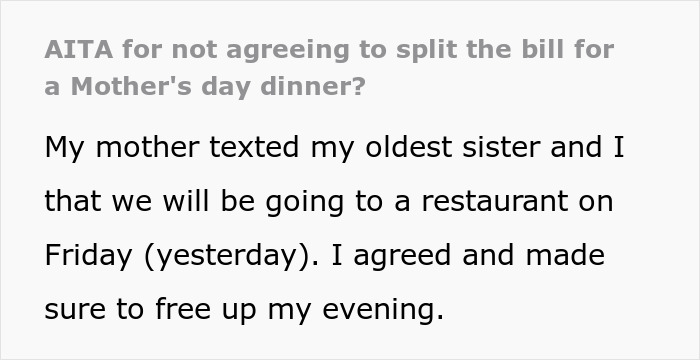
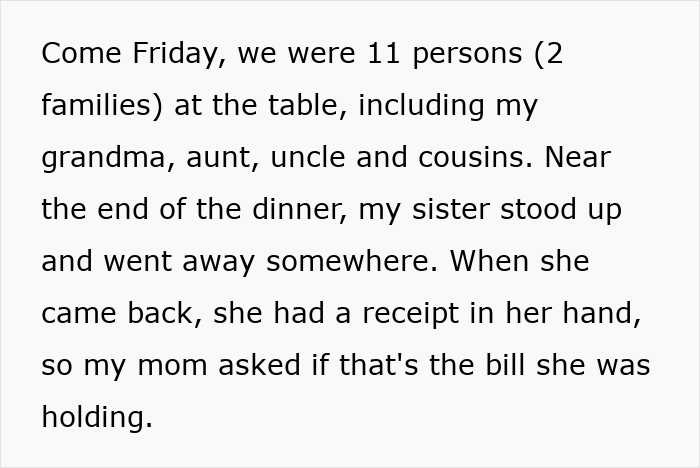
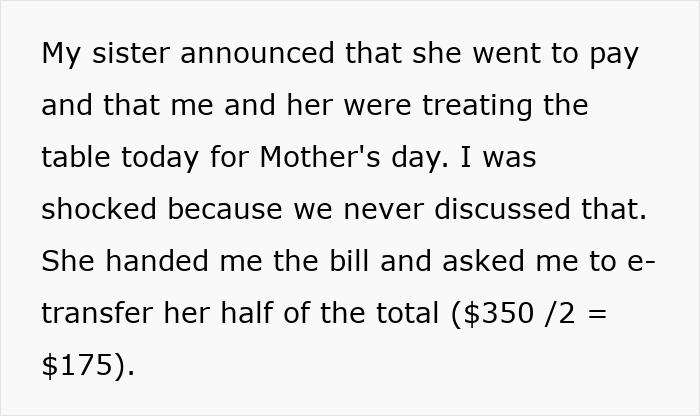

Image credits: freepik (not the actual photo)
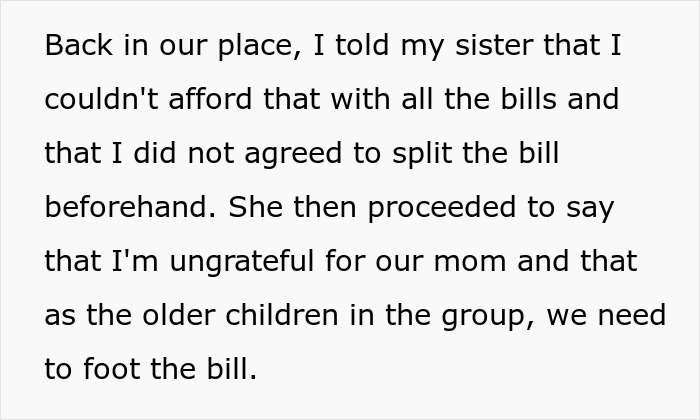
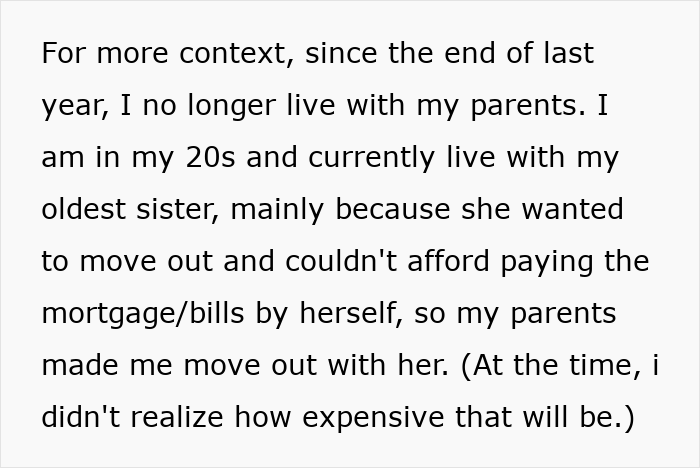
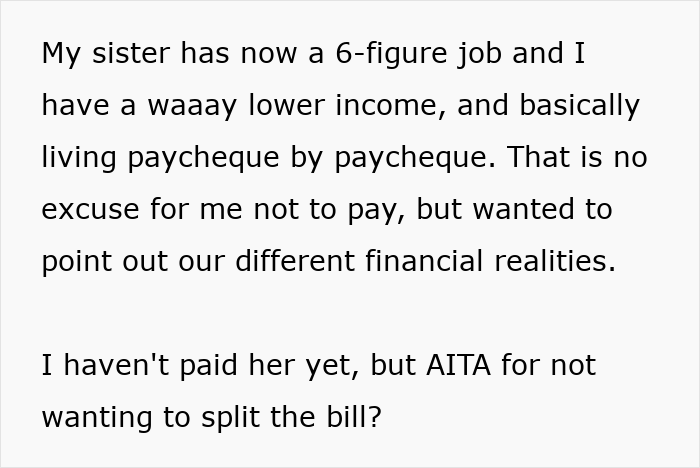
Image credits: Alternative-Emu-5955
What to do when the bill gets passed around like a hot potato, according to the experts

Image credits: pexels (not the actual photo)
Many of us know the scenario… You’re out with a group of people, having a great time and the bill finally arrives. It’s a long list of food and beverages. It’s expensive. The check gets passed around like a hot potato. Mobile phones come out as each person tries to remember, and calculate what they had.
Often, there’s an unspoken rule that everyone will pay for their portion. But sometimes, things get tricky. For example, you all agree to split equally. But one person had lobster and champagne while another nibbled on a salad while sipping water. So what are the actual rules?
According to etiquette experts, it depends on the circumstances.
In some situations, it’s too difficult or awkward to split the check, especially if you didn’t speak up beforehand, says Rosalinda Randall during an interview with Bored Panda. The etiquette expert suggests that instead of making it an issue, rather just pay up. “Consider it an investment for being a part of the group and having a good time,” Randall told us. “Cut back on a couple of specialty coffees for a few days.”
The etiquette expert adds that there are times someone really might not be able to split the bill. “If you find it embarrassing or too personal to divulge your financial situation, you can tell them you had a late lunch; therefore, you won’t be ordering, tell them that you’re on a diet, or tell them that you’re meeting someone for a late-night supper.” Randall adds that either way, you should never ask others to share their meal with you.
Special occasions, like Mother’s Day or a birthday might be treated a bit differently to a casual night out with family or friends. Often, the person doing the inviting will be the one forking out money.
“If I invite everyone to a party [at] a restaurant, and I want everybody to enjoy themselves…I’m going to pay,” says etiquette expert Diane Gottsman, owner of The Protocol School of Texas. Sometimes, guests will insist on paying their own way, and that’s something you can discuss if it arises. But Gottsman believes “the intention should be that you’re going to pay.”
If the tables are turned, it’s your birthday and your friends have invited you out, it’s generally expected that they’ll cover your portion of the bill. “Typically the group chips in for the birthday guest and they divide the bill equally as a birthday gift to the person,” explains another etiquette expert, Myka Meier, who is the founder of Beaumont Etiquette.
“Don’t let an off-balanced split check split up the relationship”: an etiquette expert’s advice
In the situation of the siblings, Randall believes the issues might run a bit deeper than just one innocently assuming the other would pay half. “Family dynamics can be tricky, especially where one sibling was forced to move out with another,” explained the expert. “Depending on the character of the sibling, she may feel superior because she was backed up by their parents [forcing her younger sibling to move in with her]. Or in charge of the younger sibling just because she is older.”
Randall says it’s possible the older sister assumed their sibling would be just as excited as she was to treat everyone, or that you’re doing okay financially. Or, perhaps she felt she could ‘boss’ them around because they’re younger. However, Randall says the older sister should not have imposed her ideas or assume that the younger sibling would automatically agree.
“It is sad and unfortunate that the sister is using guilt and shame,” Randall told Bored Panda. “Maybe she expresses her love for mom by footing the bill. It’s wrong and insulting to insinuate the other sibling doesn’t appreciate or love her less because of their current financial situation.”
The expert suggests that if that the siblings use the situation as an opportunity to calmly discuss their financial situations and establish some new rules. For example, always discussing who pays what in advance. “This unpleasant situation can open the door to communicating as two adults, not siblings, preventing future assumptions,” she added.
We asked Randall what she’s say to the older sister in this scenario… “Since you assumed, imposed and shamed your sibling into splitting the check, the right thing to do is to acknowledge that you handled it poorly and ask only for the amount spent on your mother,” she replied. “Perhaps it was an innocent assumption on your part, but they are an adult. While it can be a challenge to see one’s younger siblings as adults, not doing so will drive a wedge between you.”
Randall says that under the circumstances, the younger sibling has the right to refuse to pay for the other family members. “However, if financially possible, I would consider contributing this time to avoid further conflict and with the understanding that there will be no next time,” she added.
Common courtesy goes a long way in avoiding any clashes or confusion over a restaurant check
On a normal night out, there are also a few unwritten rules to consider. For example, if you’re the only one at the table drinking alcoholic beverages, you should cover the cost of those drinks. You can even ask that the drinks are put on a separate tab to make things easier. Or order them at the bar, if possible.
Meier explains that alcoholic beverages are often more costly than the food. “So if only one person is drinking, it would be kind for that person to offer to pay more,” she told bonappetit.com.
If you are on a budget and will only be ordering a drink and filling up on the complimentary chips, speak up ahead of time, says Randall. “Whether you don’t want to split the check or have to leave early, inform the group in advance,” she adds.
In general, informing the group in advance saves time and awkwardness, explains the expert. “What if you forget? When the check arrives, discreetly mention that you only had a salad, ‘I’ll pitch in for that and extra toward the tip.’ Giving a little extra toward the tip is a gesture of good will,” explained Randall. “In most cases, you’ll be forgiven.”
However, she adds that next time, you should plan ahead by saving up. “Not participating in the meal with everyone can be uncomfortable,” she told us. “They may feel compelled to offer you some of their food.”
Of course, common courtesy (and sense) goes a long way in avoiding any clashes or confusion over a restaurant bill. If you’re out with a group and someone else is paying, or you’ve all agreed to split the check equally, don’t be overly extravagant when the rest are eating modestly. And if you do go for the caviar and French champagne, it’s only decent that you offer to pay extra.
“The table may not take the person up on that offer, but the person eating the lobster when everyone else had chicken should offer out of respect,” advises Meier. “Practice some self-awareness here, and try to order in the ballpark of other diners at the table, generally speaking,” adds bonappetit.com. “And hey, if you’re really yearning for the lobster, all power to you—just don’t expect your friends to split the cost.”
Some were surprised the bill wasn’t higher and they wanted more information
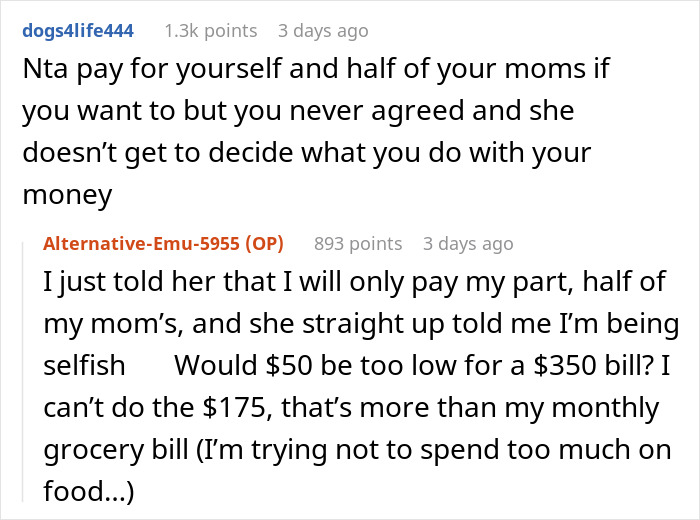

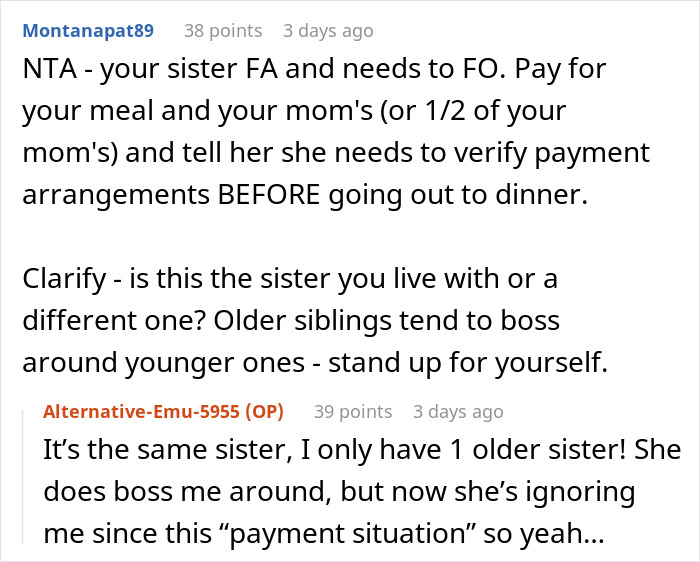


Many people felt the sister was way out of line

